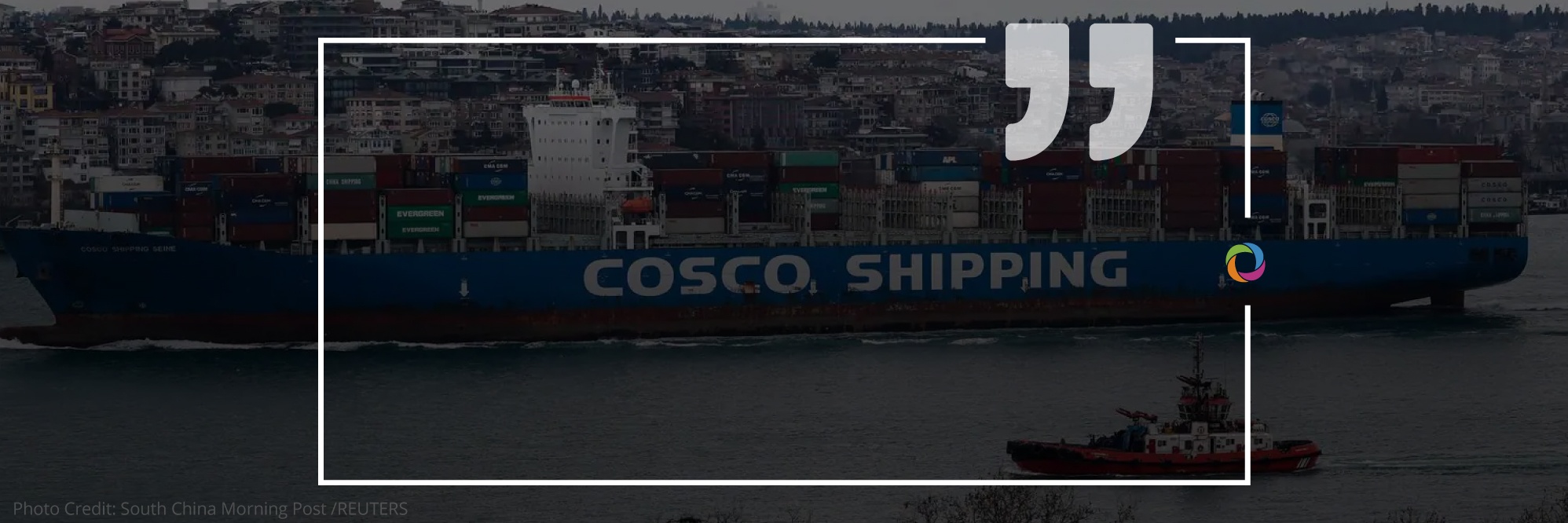In mid-April, the world’s three largest container shipping lines, Denmark’s Maersk, France’s CMA CGM, and Swiss-based MSC suspended their bookings to and from Russia. This was one of the many sanctions that aimed to stop the Russian invasion of Ukraine which began at 5 am on February 24.
However, this decision that was intended to target Russia also has repercussions for international trade. Nonetheless, “There is room to believe that international trade will at some point return to a more prosperous outlook” according to certain experts. Check out more on this subject by reading the opinions below.
Key Takeaways:
- The world’s three largest container shipping lines, Denmark’s Maersk, France’s CMA CGM, and Swiss-based MSC, suspended their bookings to and from Russia in mid-April as a sanction to Russia’s invasion of Ukraine.
- The exit of major container shipping companies — which transport most manufactured goods around the world and are essential to international trade — is expected to cause a major decline in shipments.
- The Delo Group’s CEO, Dmitry Pankov, estimates that due to this decision the drop in shipments (to and from Russian ports) in the northwestern region will be around 90% to 95% from May onwards if no alternatives appear on the market.
- With congestion and the resulting delays as well as inflation and rising fuel and energy costs that will be passed on to customers, already high freight rates are likely to rise even further, at least in the short- to mid-term.
- One expert believes no significant impact on the global supply chain will occur.
- The likely current shock in freight prices will be mitigated by global economic trends
What is the impact of this decision on global shipping supply chain flows?

“From an operational point of view, we must take into account, together with the suspension of bookings to and from Russia, also the ban on all Russia-linked ships and the blocking of the Black Sea passage (where approximately 200 vessels are still in Ukrainian ports, according to Windward Ltd). These three factors undoubtedly affect the performance of global shipping supply chain flows that we used to see before February 24. Moreover, we have to consider that Russia is one of the world’s largest exporters of oil and petroleum products and Ukraine accounts for a fifth of global wheat and barley exports. This means that, especially in the EU which is very close to the conflict area, companies and governments need to replace suppliers, moving to other regions. New routes are definitively beginning from Argentina, Australia, and Canada. In the meanwhile, we can note – even at a formative stage – the rerouting of such cargo flows from the sea (i.e., Russian ports and waters) to rail thorough “Trans-Siberian” to avoid the ban on Russian exports. Moreover, it is also to be noted that cost of insuring freight shipping has increased.”

“Overall, more supply chain congestion, delays, and thus disruptions will occur. Aside from the Russian and Belarussian ports in the Baltic and Black Seas, significant problems will occur in Central and Northern Europe and also in further places. In Europe, ports are already congested and the situation is likely to worsen due to further container ship pileups. For example, due to sanctions and the accompanying inspections, thousands of containers are already stuck in Rotterdam. As in other ports, they must be checked for restricted commodities and dual-use items, hindering operational process tremendously. Furthermore, shipping lines are looking for terminal space to store containers that are already on the water and destined for Russia or Ukraine. Then, lines are trying to reroute. As a result of alternative ports receiving more cargo than usual, it is likely that these will equally witness congestion. Reduced container availability and a lack of equipment on alternative trade lanes will then worsen the situation. As rail freight between China and Europe is interrupted and air freight rates are set for a huge rise, there is hardly an alternative to such a domino effect scenario.”

“The Russia-Ukraine crisis is expected to affect world trade logistics heavily in the near future, especially in view of the sanctions with regard to the impact on fuel prices. The Russian invasion of Ukraine has already disrupted supply chains that are still recovering from the COVID-19 pandemic. The worsening situation between Ukraine and Russia will have a significant impact on international shipping and logistics, particularly with delayed deliveries, higher costs, and transportation challenges. As Ukraine is one of the largest grain and corn suppliers in the world, this could have an impact on Europe’s food supply. Several Ukrainian ports such as Odessa are responsible for moving wheat. Other global supplies like platinum, aluminum, steel, and sunflower oil will become scarce. The closure of these ports could send the price of food skyrocketing. Global supply chains are already strained. As this follows two years of disruptions from the pandemic, many industries are bracing for the worst. The damage to supply chains will depend on the length and severity of the crisis.”

I do not think it will have much impact on global supply chain flows. Russia’s GDP and external trade is slightly higher than Spain’s but lower than Canada’s. Brazil, Italy and France are much bigger economies. Moreover, the trade embargo is being circumvented using feeder services from third countries e.g., China.”

“Shipping traffic from the Black Sea region is currently experiencing severe disruption due to the war which has led to the suspension of a number of shipping lines to and from Ukraine, an important corridor for shipments of grain, minerals, and Russian oil to the rest of the world. During the coming period, many logistic companies intend to start searching for alternative markets to compensate for the suspension of shipping lines with the two countries, and these alternatives are represented in several countries including Romania, France, Brazil, and Argentina. It has also become difficult to transport some goods such as metals, which are shipped in containers, and nearly half of the world’s container ships will not be heading to and from Russia, according to the announcements from shipping companies, according to Bloomberg.
What are the consequences of sanctions on container shipping rates?

“It may sound strange, but it seems that the war in Ukraine has not had an impact on container freight rates! Xeneta Shipping Index, Drewry’s composite World Container Index – WCI and Freightos Baltic Index (FBX) do not reveal any significant spread. Actually, we have to consider that across all major trade corridors, contracted rates are up almost 100% year-on-year (XSI) and the liner industry is expected to report nearly US$200bn in 2021! We can argue that the three alliances are using their market control to take out some of the freight-forwarders exposed to surcharges and do business directly with beneficial cargo owners. On the other end, certainly logistics chain remains stressed (traders secure space on vessels, despite the price), at the end of the day affecting consumers.”

“With congestion and the resulting delays as well as inflation and rising fuel and energy costs that will be passed on to customers, already high freight rates are likely to rise further, at least in the short- to mid-term. Geopolitical concerns may further foster this immediate trend. However, a dip in freight rates could be observed prior to the military campaign and the accompanying sanctions. If one considers this previous dip as an indicator of a fall in overall demand and when bearing in mind that Russia and Ukraine hold comparatively small shares of global freight stream and when also keeping in mind that a global economic downturn could follow as a long-term consequence of Russia’s military campaign, there is reason to believe that a rise in freight rates may be of a rather short nature. Thus, rates will eventually decline again. What we’ll most likely be seeing is thus an immediate shock in prices that will then be mitigated by global economic trends.”

“All ocean freight floating cargo initially bonded to Ukraine will now be redirected to neighboring ports such as Constanta (Romania), Tripoli (Lebanon), or Piraeus (Greece) among others which will see a significant increase in business. The Bunker Adjustment Factor or BAF additional surcharges will be levied on the ship operators to compensate for the fluctuations in the fuel prices and will be added to freight rates.”

“Any disruption in shipping may impact rates, however, the forces underpinning shipping rate hikes have a different nature.”

“In the middle of last month, the Ukrainian and Russian waters in the Black Sea and the Sea of Azov were added to the list of vulnerable areas following a decision from the Joint War Committee which includes representatives from Lloyd’s of London and the International Underwriting Association of London, and this will likely lead to the high insurance premiums required to ship or transport goods through these waters, especially since it is unclear how long this war will last.”
See also: Global economic impacts of Russia’s war against Ukraine
How will this action impact the international trade sector?

“While the 6th package of sanctions is on the table (Russia is a major exporter of some of the world’s most important commodities), elevated volumes of trade are expected in the coming months, even if in a volatile scenario as per the latest International Monetary Fund’s World Economic Outlook. We cannot forget that, before Feb. 24, commodities were trading at their highest levels since 2008, and inflation has reached 7% in Western countries. Now, in order to avoid disruption to the supply chain, a sort of substitution mechanism has been put in place by importers replacing sources of key commodities, but in the meantime, global prices of oil and natural gas (and, in addition, key mineral and food commodities) have increased, as the G7 still do not coordinate closely enough to ensure a stable supply. Depending on the intensity of new sanctions and the duration of the brutal invasion, we could consider different scenarios for trade. Of course, the demand for energy will move towards other suppliers (and goods, considering the import of LNG for example from the US) with trade route adjustments but we cannot expect a full diversification in the short term (however, the International Energy Agency and S&P Global foresee Russian production losses in May) or a concrete and effective green transition. In the meantime, neutral countries (India, Mexico, and Turkey) will probably take advantage as they can secure cheap supplies from Russia at least in a short-term scenario. But, it’s not only an energy emergency. So, in order to avoid a global food crisis and the risk of fragmenting the global economy into geopolitical blocs, we must pursue diplomacy until the war ends.”

“In general, the Russia-Ukraine conflict puts the global economic recovery and thus increases in international trade at high risk. Persisting or new anti-COVID-19 measures in China and sanction-related supply chain disruptions will further continue to disrupt international and especially seaborne trade. It is thus clear that international trade will not experience growth as had been hoped for after the initial lift of many global COVID-19-related restrictions in the short- to mid-term. If these trends result in renewed shortages of manufacturing inputs or essential supplies and higher inflation, this could worsen the international trade situation drastically. What intensifies this situation is that there is the additional risk of a division of the world economy into rival blocs in the long run. This will neither foster international trade nor prosperity nor peace on a global level and should be of great concern. But assuming we can avoid this situation, there is room to believe that international trade will at some point return to a more prosperous outlook and with it, those businesses engaged in the sector.”

“The surprising result may be more diversified and consolidated rail freight operations in China. There will therefore be no major impact on China – Europe rail services in both directions for the time being. Routes to/from/to will be adjusted to avoid crossing through Ukrainian territory. Road transportation: with all borders to/from Ukraine remaining closed, with certain exceptions exclusively for aid/relief and government/defense movements, the crossings are difficult and many transporters have chosen to cease operations to/from Russia. With regard to airfreight logistics, all flights to/from Ukraine remain suspended as well as most flights to/from Russia. The European Union has banned all Russian-owned and Russian-controlled aircrafts from entering EU airspace. Many airlines will also avoid Russian airspace by taking a more southern route and, as a result, flight times will increase and hence costs. Among the outcomes, we can expect increases in transportation and logistics costs, supply chain disruptions, rising gas and electricity prices, etc. Logistics carriers have also imposed a War Surcharge to be imposed from mid-March 2022 until further notice.”

“As has been said, Russia is a first-level military actor but a second-level economy. Global trade impact will not come from shipping lines suspending activities to Russian ports but from the uncertainty coming from the war and unexpected retaliations. Another thing is the anticipated sharp decrease of grain and other food exports from Ukraine and Russia that will impact more acutely upon some developing countries.”
See also: International trade faces severe risks amidst Russian-Ukrainian war

